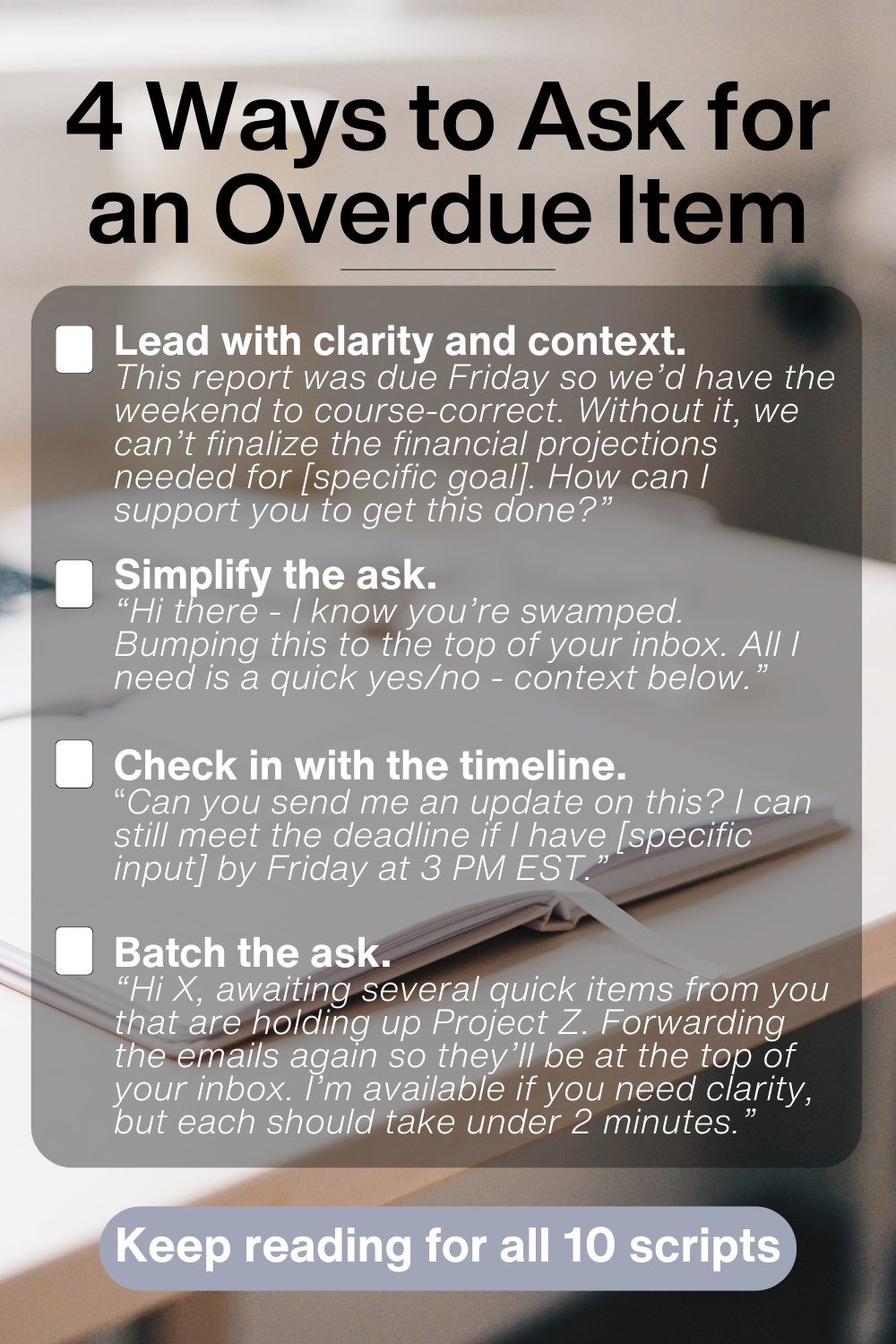
Overdue tasks are inevitable - but how you address them can make or break your team dynamics and productivity. Leadership is about progress, not perfection, and a big part of progress is knowing how to nudge without nagging.
Here’s how I approach overdue items in a way that fosters trust, accountability, and forward momentum.
10 Ways to Politely Ask About Overdue Tasks
- 1. Lead with clarity and context.
👉 Example:“This report was due Friday so we’d have the weekend to course-correct. Without it, we can’t finalize the [specifics - e.g. financial projections] needed for [specific goal]. How can I support you to get this done?”
2. Simplify the ask.
👉 Example:“Hi there - I know you’re swamped. Bumping this to the top of your inbox. All I need is a quick yes/no - context below.”
Bonus: If your recipient has studied David Allen's Getting Things Done system, they'll have heard of the 2-minute rule, which says that if something takes under 2 minutes to complete, do it right away.
No chance of a task becoming overdue if it takes 2 minutes or less to do!
3. Check-in with a timeline.
👉 Example:“Can you send me an update on this? I can still meet the deadline if I have [specific input] by Friday at 3 PM EST.”
Note: If you have already far exceeded the original due date, it’s okay to remind the recipient of the original timeline.
4. Offer help, and mean it.
👉 Example:“Are you still on track for this? How can I accelerate momentum?”
Alternatives: “help accelerate progress” or “support you”
5. Provide a starting point.
👉 Example:“I drafted [this document or plan] to get us moving. Can you please review, refine, and personalize it by [specific date]?”
6. Use humor (carefully).
👉 Example:“Heyyy - Any chance I’ll see this report before the next decade?”
7. Go direct.
👉 Example:“Please block time today to call our vendor. We owed him a decision last Friday, and it’s critical for [specific reason].”
8. Batch the ask.
👉 Example:“Hi X, awaiting several quick items from you that are holding up Project Z. Forwarding the emails again so they’ll be at the top of your inbox. I’m available if you need clarity, but each should take under 2 minutes.”
Alternatively: Create a simplified checklist or bullet points with links to the folders/files that require review that can be sent in one message.
9. Rethink the workflow.
👉 Example:“Would it make sense for [Chris] to start this task, and for you to handle revisions? What’s an easier way to make progress here?”
10. Reassess priorities with empathy.
👉 Example:“Originally, Task A was due last Friday, but I know you’re juggling a lot. Should we adjust the deadline or delegate part of it to someone else? Happy to shift to support you.”
Overdue Tasks Are Really About Managing Expectations
Overdue tasks aren’t just about deadlines - they’re about communication, priorities, and trust.
The goal is to handle these situations in ways that build alignment instead of resentment.
Whether you’re leading a team or managing your own workload, here’s your next step:
💡 Audit your own workflow. What’s overdue, and how can you make the follow-up process simpler, clearer, and more human?
💡 Model the behaviors you want to see. A little proactive communication goes a long way.
💡 Leverage tech and AI: Most project management tools include built-in email reminders and follow-up tasks to mitigate overdue tasks.
Slack can automatically send you a notification to return to a message at a certain date and time.
Chaser - which connects with Slack - can be used to assign tasks to the do-er and watchers, plus do all of the follow up for you.
Your turn: What’s one strategy from this list you can use today? Share this with your team to create a culture of accountability without the awkwardness.
Because following up doesn’t have to be painful.
P.S. Want to improve your communication around expectations for upcoming projects? Read this one next to get clear on how to prioritize new tasks.










Member discussion